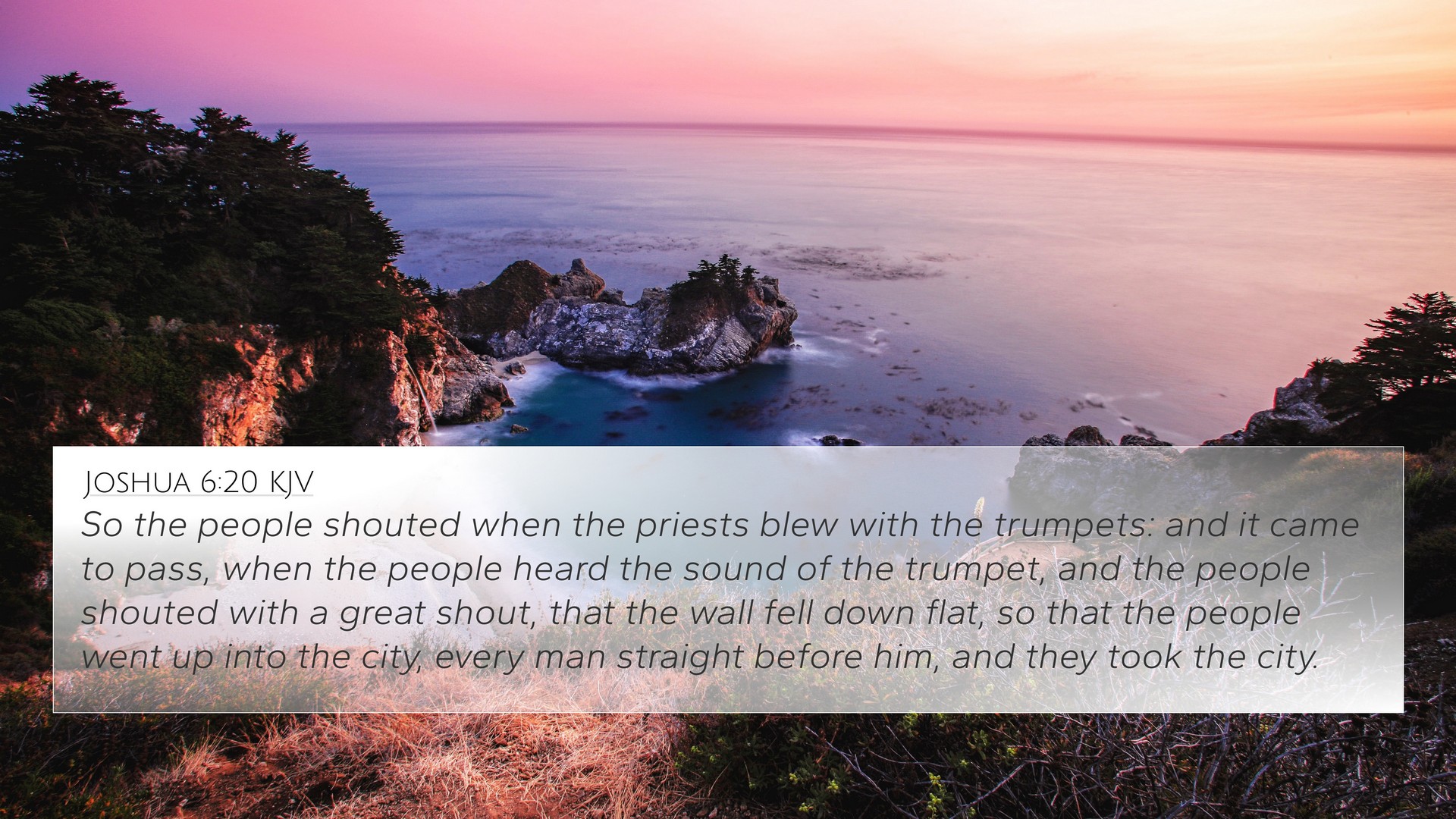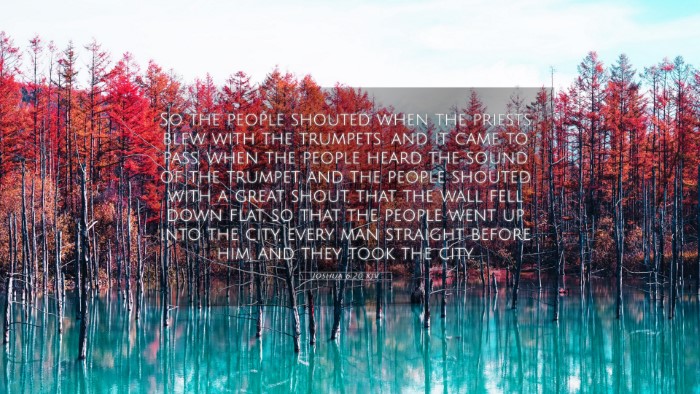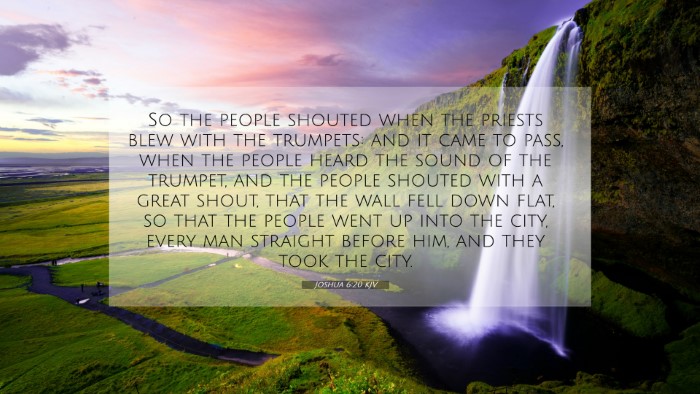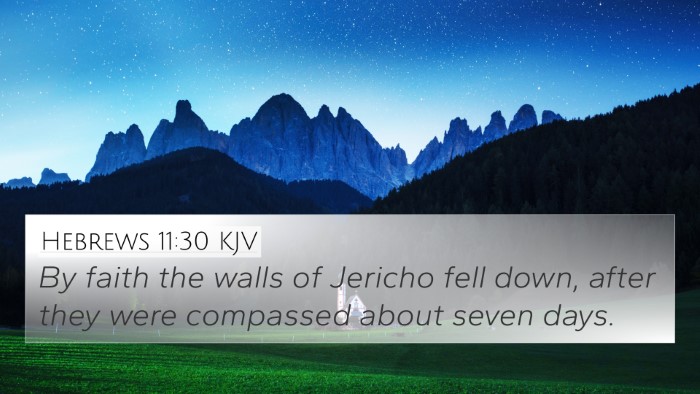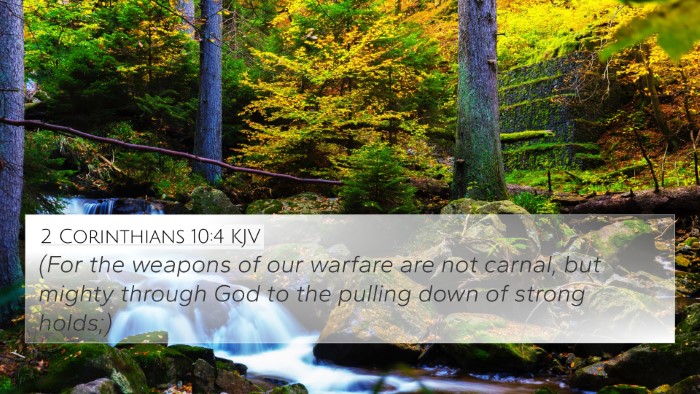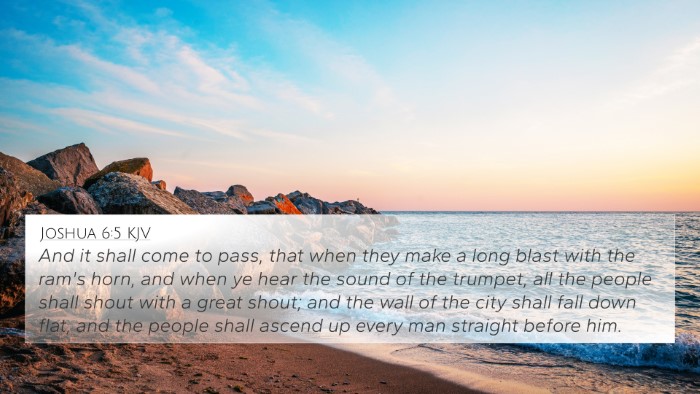Understanding Joshua 6:20
Verse: "So the people shouted when the priests blew the trumpets: And it came to pass, when the people heard the sound of the trumpet, and the people shouted with a great shout, that the wall fell down flat, so that the people went up into the city, every man straight before him, and they took the city." (Joshua 6:20, KJV)
Summary of Meaning
This remarkable event marks the fulfillment of God's promise to the Israelites as they conquer Jericho through faith and obedience. The sound of the trumpets, along with the collective shout of the people, signifies the power of united worship and divine intervention.
Commentary Insights
Matthew Henry: Highlights that the Israelites, through their obedience, experienced the miraculous power of God. The trumpets represent a call to worship and signify the Lord’s presence in their victory. The act of shouting reflects their faith, showing that they believed in God's promise before seeing it fulfilled.
Albert Barnes: Focuses on the theological significance of faith in action. The fall of the walls wasn't due to natural causes but was purely a supernatural act of God in response to the faith demonstrated by the Israelites. This passage illustrates the principle that obedience to God leads to victory.
Adam Clarke: Emphasizes the role of divine instruction in their victory. The order to march around Jericho and the subsequent shout was commanded by God. Clarke indicates that this act of faith is a vital example of trusting God’s sovereignty over one's circumstances.
Cross-References and Thematic Connections
Joshua 6:20 can interconnect with various scripture passages that explore themes of faith, obedience, and God's power. Below are key cross-references:
- Hebrews 11:30: "By faith the walls of Jericho fell down, after they were compassed about seven days." - This verse emphasizes the faith that led to Jericho's downfall.
- 1 Corinthians 1:27-29: God often chooses what is weak to shame the strong, reflecting how He used the Israelites' shouts to achieve victory.
- Exodus 14:21-22: The crossing of the Red Sea, demonstrating God’s power through obedience.
- Psalm 20:5: "We will rejoice in thy salvation, and in the name of our God we will set up our banners." - Connecting victory and praise to God.
- Romans 4:20-21: Illustrating Abraham's faith as a precursor to the faith shown by Israelites.
- 2 Chronicles 20:22: God fights for His people when they praise Him, similar to the Israelites at Jericho.
- James 2:26: "Faith without works is dead," showing that active faith (like the shout) is essential.
- Luke 18:27: "The things which are impossible with men are possible with God," emphasizing divine capability.
- Joshua 1:9: God's command to be strong and courageous, aligning with the confidence shown at Jericho.
- Revelation 19:1: The ultimate victory of the faithful, showcasing God's faithfulness, similar to that in Joshua's time.
Thematic Bible Verse Connections
This passage establishes several thematic connections:
- The Power of God: The wall's collapse illustrates God’s omnipotence in human history.
- Faith Through Obedience: The action of the Israelites embodies true faith marked by obedience to God's command.
- Divine Triumph Over Obstacles: The physical wall symbolizes any spiritual or physical barriers one may face.
- The Importance of Community Worship: The collective shout of the people underscores the strength found in unity and communal faith.
Tools for Bible Cross-Referencing
If you want to delve into a deeper comparative Bible verse analysis, consider the following tools:
- Bible Concordance: Helps in locating verses and understanding their meanings through context.
- Bible Cross-Reference Guide: A resource for tracking themes and connections across scripture.
- Cross-Reference Bible Study: Engage with the Bible holistically through thematic studies.
- How to Use Bible Cross-References: Integrate multiple verses to discover deeper insights.
Conclusion
Joshua 6:20 not only represents a remarkable historical event but also serves as a rich source for thematic study and cross-referencing in the broader context of the Bible. The connections between scriptural accounts enhance the understanding of God’s faithfulness and the power of collective faith in action.
